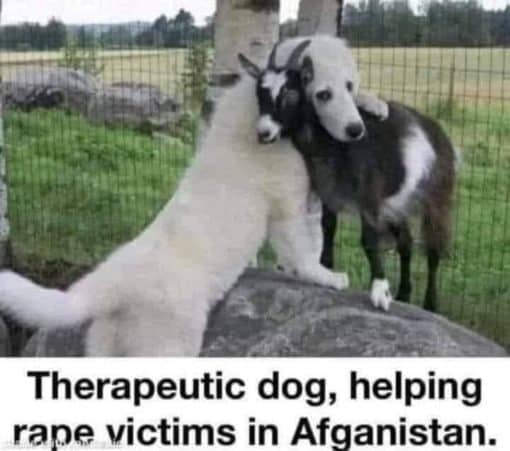Therapeutic dog helping rape victims in Afghanistan
Understanding why the sentence "Therapeutic dog helping rape victims in Afghanistan" may be seen as funny or ironic needs a careful dissection of the cultural, historical, and social contexts surrounding the subject. Importantly, however, it should be clear that the humor or irony is not coming from the traumatic circumstances of the victims themselves, which is an extremely serious and unfortunate situation deserving of nothing but empathy and respect.
The irony comes to play in the fact that dogs in Afghanistan, as in many Muslim-majority countries, are commonly regarded with cultural aversion. Historically, Islamic tradition considers dogs to be unclean, leading to a generally negative sentiment toward them in everyday life. So, the thought of a therapist dog being used for emotional support, typically a western concept, in this setting is an unexpected twist – creating a situation that can be perceived as ironic.
The humor aspect, again, concentrates on this clash of cultures. Western therapeutic practices often include therapy animals, with dogs being amongst the popular choice. This belief in the healing power of animals and a general fondness for dogs is almost the complete opposite in Afghanistan. The mental image of this dog in a setting where they may not typically be welcomed, trying its best to provide comfort and therapy can be seen as somewhat comedic – in the same way a fish out of water scenario might be.
Another angle that breeds irony is the seriousness of the role, juxtaposed with assumptions about the capacity of dogs. While we are moving towards a wider acceptance of animals' healing capabilities, the notion that a dog could help someone recover from an extreme trauma might strike as ironic. The gap between the gravity of human suffering and the simplicity generally associated with dog behavior is another unexpected twist that intersects here.
The statement is a paradox striking at the heart of two very different cultural values and norms. It's more of an irony than humor because it challenges the normative values that these two societies hold. The dog, a symbol of comfort and friendliness in the West, takes on a role that's incredibly significant for trauma healing, in a place where it's conventionally seen as less desirable.
Lastly, the humor or irony doesn't downplay the seriousness of rape trauma or the benefits of therapy; rather, it illuminates the interesting cross-cultural practices happening globally. It shows how even in the face of deep-rooted norms or beliefs, there can be exceptions and adaptations – such as potentially in this case, where a dog comes to the emotional rescue in a land where they're traditionally not favored. Therapeutic dog helping rape victims in Afghanistan
